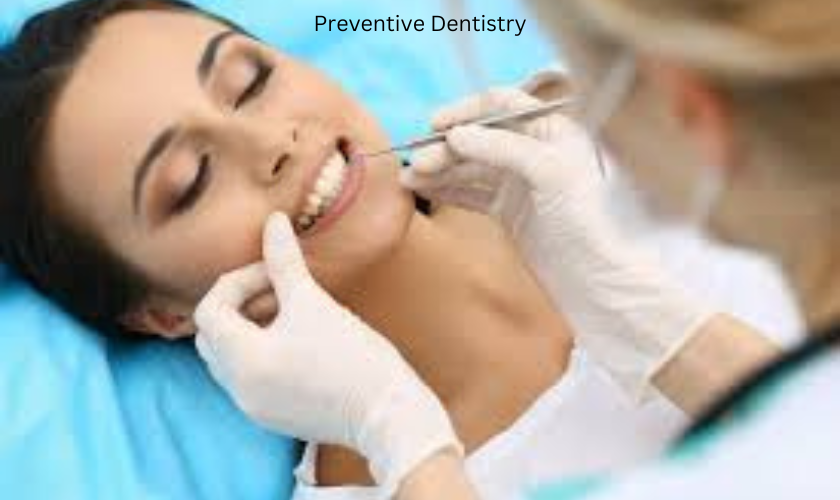Preventive dentistry is maintaining the health of your teeth and gums. It helps prevent cavities, restore enamel and avoid gum disease. Brushing and flossing daily is a type of preventive dentistry. However, there are some instances where your precautions render useless, and you need extra care.
Types Of Preventive Dentistry
Many treatments are available in dentistry; however, not all of them can be considered preventive measures. The different types of preventive dentistry available at dentists are:
Dental Sealants
Dental sealants are thin coatings of hardened resin painted on teeth to prevent decay. They are placed on the back teeth (premolars and molars). Sealants prevent cavities on chewing surfaces by forming a barrier that excludes food and germs. The entire process is quick, easy, and relaxing. It takes around 30 minutes, depending on the number of teeth.
The materials used in dental sealants are- glass ionomer and composite resin.
Glass ionomers are highly acid based and applied in a paste form. This particular type of dental sealant shrinks less and releases fluoride. The fluoride may deplete over time. But the enamel gets stronger. In comparison to other types, it also has a shorter retention period.
Composite resin dental sealant is made of ceramic and plastic compounds. Dentists harden this type of sealant by curing it with light. Composite resin sealants can help to prevent tooth decay. These sealants can last up to ten years and have a high retention rate. Composite resin dental sealants are hydrophobic, i.e., they repel water, preventing bacterial contamination from stagnant moisture. Dentists advise this kind of dental sealant for both baby and permanent teeth.
Fluoride Treatments
Fluoride is a natural mineral found in water sources that strengthen teeth and prevent cavities. Fluoride treatments use highly concentrated fluoride solution applied to the patient’s teeth. The mouth is cleaned and dried before this treatment.
The whole procedure of fluoride treatment takes a few minutes. Dentists take a small brush and apply the fluoride solution to the teeth. It takes 4-6 hours for your teeth to absorb the fluoride, which is brushed away.
The benefits of fluoride treatment are:
- Reduce risk and growth of cavities
- Prolong the life of primary and adult teeth
- Protects your enamel
- It puts minerals back into your teeth
- Prevent tooth decay
Several fluoride treatments are available in the market in the form of toothpaste, mouthwash, and fluoride strips. However, they are less effective than professional procedures. Professional fluoride treatments are longer lasting and show better results. They are also safer as a small chemical enters your digestive system.
Teeth Cleanings
Teeth cleaning is a part of the oral hygiene routine. It involves the removal of plaque and detecting cavities.
The dentist performs a physical examination of your mouth before the actual cleaning process. They use a small mirror to check around your teeth and gums for signs of gingivitis and other concerns. Heavy plaque build-up (tartar) is scraped off from around your teeth and washed off.
A high-powered electric brush is used with gritty toothpaste to clean your teeth. This process gently scrubs away plaque accumulated on the teeth. The grooves between your teeth are flossed expertly. When the dentist is satisfied with the cleaning, they rewash your mouth, followed by a fluoride treatment.
Professional teeth cleaning treatments are especially beneficial when you want to brighten your smile and boost the overall health of your teeth. As a bonus, your bad breath reduces and prevents cavities and tooth decay.
Mouthguards
Mouthguards are protective equipment that protects your teeth, gums, tongue, and lower facial area. This piece cushions the blows to your jaws and teeth, thus preventing damage to teeth, jaw, neck, and brain.
Dentists take impressions of the upper and lower jaw. The dentists send the impressions to a laboratory where they are made. Mouthguards are customized from a piece of hard plastic.
A well-fitted mouthguard helps prevent injuries and traumas to your teeth, jaw, and gums. It prevents injuries like a chipped or cracked tooth, broken tooth, and damage to soft tissues. Additionally, mouthguards also help prevent headaches and snoring, which improves the quality of sleep.
Oral Cancer Screenings
Oral cancer screening is an examination performed by the dentist to check for signs of cancer or precancerous conditions in your mouth.
Oral cancer develops in the mouth. It presents as a sore or persistent growth in the mouth. Lips, gums, tongue, inner cheeks, and mouth can all develop oral cancer. There are many cases of oral cancer. Oral cancer, like all cancers, can be cured if detected and treated early.
The symptoms of oral cancer are:
- Sores that do not heal
- White and reddish patch in mouth
- Loose teeth
- Unexplained numbness and loss of feeling in the lower facial area
- Difficulty in chewing, swallowing, and/or moving the jaw
Around 11 out of 100,000 people have the chance to get oral cancer. It is easily cured if detected early during its development. The risks of oral cancer increase due to excess tobacco and smoking, previous oral cancer diagnosis, and hereditary issues.
Suppose your examination for oral cancer comes as positive. In that case, the dentist will need to perform surgery to remove the infected cells. First, local anesthesia is given to numb the area for operation. The dentist removes the cancerous cells and some more surrounding the area for extra prevention.
Pain, numbness, and minor bleeding are expected after the surgery. There is little to no chance of cancer returning after this procedure.
The Bottom Line
All it takes is a trip to the dentist to get the beautiful, right smile you deserve. Contact the dentist you trust to get preventive dentistry treatments. You must also maintain an excellent oral hygiene routine, good dietary choices, and healthy lifestyle habits to keep your teeth and overall health in optimum condition.








